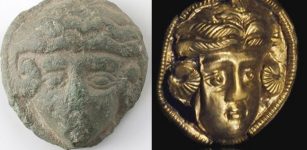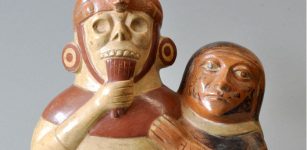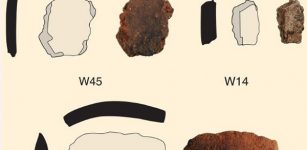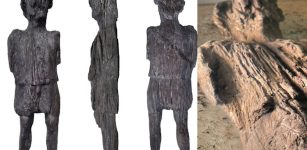Ostracism: Political Practice In Ancient Athens
Conny Waters - AncientPages.com - Ostracism in ancient Greece was a political procedure that resulted in a temporary banishment from a city by a popular vote. Under the Athenian democracy, a citizen who threatened the stability of the state could be banished from the city for ten years. Each year the Athenians were asked in the assembly whether they wished to hold ostracism.
Any citizen entitled to vote in the assembly could write another citizen’s name down, and, when a sufficiently large number wrote the same name, the ostracized man had to leave the city within 10 days.
The School of Athens by Raffaello Sanzio da Urbino. Credit: Public Domain
In Exile, Ostracism and the Athenian Democracy, Forsdyke Sara writes that "the institution of ostracism has long puzzled historians. Why did the Athenians invent a procedure for exiling citizens by democratic vote in the late sixth or early fifth centuries? How are we to explain the peculiarities of the institution, the fact that there were no speeches of accusation, for instance, or that potential victims were not permitted to defend themselves? Why was the term of exile limited to ten years, after which the victim could return with his property and reputation intact?”
See also:
Ancient Greeks Invented Alarm Clocks
Ancient Greek Myth Reveals The Olympic Games Were Founded By A Cheater
What Was The Role Of The Priests And Priestesses In Ancient Greece?
Forsdyke's theory is that “the problem of exile played a central role in the democratization of Athens.” Forsdyke argues that “the development of democracy was not a conscious process towards a more egalitarian political system but, in part, the result of periods of crisis, crises of exile. In these crises, non-aristocrats were compelled to involve themselves in the political struggles of aristocrats and thus bring stability to the polis.
In doing so, they assumed both power over decisions of exile and political power. The fundamental role of exile in the development of Athenian democracy helps to explain the symbolic importance of ostracism as an expression of popular power.”
Ostracism is said by Aristotle, in his Constitution of Athens, to have been introduced by Cleisthenes in his reform of the Athenian constitution after the expulsion of Hippias (c. 508 bc), but the first use of it seems to have been made in 488–487 B.C. , when Hipparchus, son of Charmus of Collytus, was ostracized.
Written by Conny Waters – AncientPages.com Staff Writer
Copyright © AncientPages.com All rights reserved. This material may not be published, broadcast, rewritten or redistributed in whole or part without the express written permission of AncientPages.com
Expand for referencesForsdyke, Sara. "Exile, Ostracism and the Athenian Democracy." Classical Antiquity 19, no. 2 (2000): 232-63. doi:10.2307/25011121.
More From Ancient Pages
-
 Unique Ancient Bronze Miniature Portraits Of Alexander The Great Found In Ringsted On The Island Of Zealand
Archaeology | Apr 11, 2024
Unique Ancient Bronze Miniature Portraits Of Alexander The Great Found In Ringsted On The Island Of Zealand
Archaeology | Apr 11, 2024 -
 How Large Was The ‘Giant’ Dunkleosteus Terrelli – Prehistoric King Of The Oceans?
News | Apr 10, 2023
How Large Was The ‘Giant’ Dunkleosteus Terrelli – Prehistoric King Of The Oceans?
News | Apr 10, 2023 -
 Selah – Mysterious Biblical Word Of Unknown Meaning
Biblical Mysteries | Jan 5, 2018
Selah – Mysterious Biblical Word Of Unknown Meaning
Biblical Mysteries | Jan 5, 2018 -
 Rare Viking Boat Burial At Kiloran Bay In Colonsay, Scotland Remains A Fascinating Find
Featured Stories | Mar 6, 2023
Rare Viking Boat Burial At Kiloran Bay In Colonsay, Scotland Remains A Fascinating Find
Featured Stories | Mar 6, 2023 -
 Stonehenge’s Monumental Altar Stone Came From Scotland – Not Wales As Previously Thought
Archaeology | Aug 16, 2024
Stonehenge’s Monumental Altar Stone Came From Scotland – Not Wales As Previously Thought
Archaeology | Aug 16, 2024 -
 7,000-Year-Old Unique Artifacts Discovered Under Melting Ice In Canada
Archaeology | Nov 30, 2023
7,000-Year-Old Unique Artifacts Discovered Under Melting Ice In Canada
Archaeology | Nov 30, 2023 -
 South American Musical Instruments Reflect Population Relationships – Archaeological Records Reveal
Archaeology | Sep 20, 2021
South American Musical Instruments Reflect Population Relationships – Archaeological Records Reveal
Archaeology | Sep 20, 2021 -
 Biblical Pool Of Siloam In The City of David To Be Excavated And Opened To The Public
Archaeology | Jan 2, 2023
Biblical Pool Of Siloam In The City of David To Be Excavated And Opened To The Public
Archaeology | Jan 2, 2023 -
 Mysterious Underground City In Brazil Could Re-Write Ancient History – Unexplained Artifacts And Skeletons – Part 1
Ancient Mysteries | Jan 23, 2022
Mysterious Underground City In Brazil Could Re-Write Ancient History – Unexplained Artifacts And Skeletons – Part 1
Ancient Mysteries | Jan 23, 2022 -
 India: Plastic Surgery And Genetic Science – Found In Ancient Vedas – Were Practiced Thousands Of Years Ago
Ancient Technology | Oct 29, 2014
India: Plastic Surgery And Genetic Science – Found In Ancient Vedas – Were Practiced Thousands Of Years Ago
Ancient Technology | Oct 29, 2014 -
 Hundreds Of Fascinating 24,000-Year-Old Cave Paintings Discovered In Eastern Iberia
Archaeology | Sep 11, 2023
Hundreds Of Fascinating 24,000-Year-Old Cave Paintings Discovered In Eastern Iberia
Archaeology | Sep 11, 2023 -
 Archaeologists Discover Over 100 Ancient Settlements North Of Hadrian’s Wall
Archaeology | May 26, 2022
Archaeologists Discover Over 100 Ancient Settlements North Of Hadrian’s Wall
Archaeology | May 26, 2022 -
 Ancient Feneos excavations: defensive walls, five towers, sanctuary unearthed
Civilizations | Aug 23, 2015
Ancient Feneos excavations: defensive walls, five towers, sanctuary unearthed
Civilizations | Aug 23, 2015 -
 Cryptic North American Blythe Intaglios Reveal The Creator Of Life: Who Was This Unknown Being?
Featured Stories | Aug 23, 2014
Cryptic North American Blythe Intaglios Reveal The Creator Of Life: Who Was This Unknown Being?
Featured Stories | Aug 23, 2014 -
 Coronavirus: Advice From The Middle Ages For How To Cope With Self-Isolation
Featured Stories | Mar 29, 2020
Coronavirus: Advice From The Middle Ages For How To Cope With Self-Isolation
Featured Stories | Mar 29, 2020 -
 3,000-year-old pottery found in Papua New Guinea’s highlands
News | Sep 3, 2015
3,000-year-old pottery found in Papua New Guinea’s highlands
News | Sep 3, 2015 -
 Cahuachi – Complex Of Truncated Adobe Pyramids In Peru’s Desert
Civilizations | Aug 27, 2015
Cahuachi – Complex Of Truncated Adobe Pyramids In Peru’s Desert
Civilizations | Aug 27, 2015 -
 Mother, Father, Child, Marriage And Divorce In Viking Society
Ancient History Facts | Apr 27, 2020
Mother, Father, Child, Marriage And Divorce In Viking Society
Ancient History Facts | Apr 27, 2020 -
 Secrets Behind 2,000-Year-Old Roman Water Management Revealed
Ancient Technology | Aug 4, 2023
Secrets Behind 2,000-Year-Old Roman Water Management Revealed
Ancient Technology | Aug 4, 2023 -
 Unexpected Discovery Of Rare Ancient Roman Carved Wooden Figure In Buckinghamshire
Archaeology | Jun 11, 2022
Unexpected Discovery Of Rare Ancient Roman Carved Wooden Figure In Buckinghamshire
Archaeology | Jun 11, 2022

